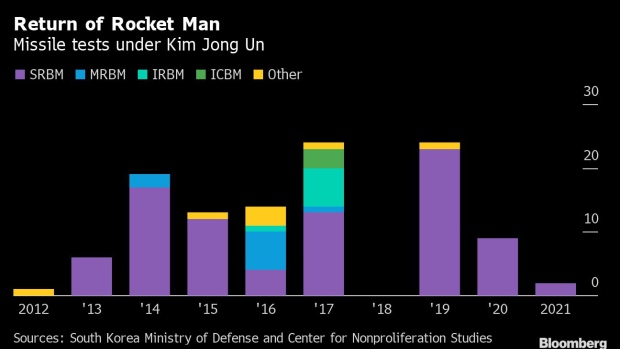May 5, 2021
Japan and South Korea Air Their Differences as U.S. Seeks Unity
, Bloomberg News

(Bloomberg) -- The foreign ministers of Japan and South Korea showed little sign of resolving differences at their first in-person meeting in more than a year, which came as the U.S. seeks their cooperation on its revised policies toward North Korea.
Toshimitsu Motegi of Japan and Chung Eui-yong of South Korea disagreed on issues including colonial-era reparations and Japan’s plans to release contaminated water from the wrecked Fukushima nuclear plant into the ocean when they met Wednesday in London on the sidelines of the Group of Seven ministerial talks, according to statements from both governments.
The ministers did concur on the importance of cooperation, the statements said. The two U.S. allies that host the bulk of U.S. military personnel in Asia have seen ties turn sour in recent years over South Korean court decisions ordering compensation for Japanese transgressions during its 1910-45 colonial rule over the peninsula, while pandemic restrictions had halted face-to-face meetings.
The talks came as U.S. President Joe Biden’s administration completed a review of its policy on North Korea and moved to seek the help of allies in ending Pyongyang’s nuclear arms program.
Biden has shown the importance he places on the two countries, which are crucial to checking China’s growing global clout and North Korea’s atomic ambitions. The president held his first in-person meeting with a foreign leader with Japanese Prime Minister Yoshihide Suga last month and plans to host South Korea’s Moon Jae-in on May 21 for his second face-to-face summit.
Leader Kim Jong Un earlier this year ratcheted up security tensions for the Biden administration when he said he would put his country on a path to develop more advanced nuclear technologies and missiles. A top North Korean official added pressure over the weekend when he labeled Biden’s comment that Pyongyang’s nuclear program is a threat as “intolerable.”
In a separate meeting between Motegi and Chung, also attended by U.S. Secretary of State Antony Blinken, the three ministers “reaffirmed their commitment to concerted trilateral cooperation toward denuclearization of the Korean Peninsula,” according to State Department spokesman Ned Price. Biden sent Blinken and Defense Secretary Lloyd Austin to Japan and South Korea in March on their first overseas trip after taking office, seeking to mend relations frayed during the Trump administration.
In his one-on-one meeting with Motegi, Chung expressed opposition to Japan’s decision to release contaminated water from the Fukushima nuclear power plant without sufficient prior consultation with neighboring countries, the South Korean government said. Motegi said he would continue to provide information and expressed concern about South Korean statements on the matter.
Motegi urged South Korea to find an early solution to the problem of compensation for Koreans forced to work for Japanese companies during colonial occupation, as well as women trafficked to Japanese military brothels before and during the war.
Japan contends all claims were settled under a 1965 bilateral agreement and a fund set up in 2015. Seoul argues Japan hasn’t done enough. Some of Japan’s largest companies have been dragged into the fray, and Motegi reiterated that corporate assets that have been seized by South Korean courts should not be liquidated.
©2021 Bloomberg L.P.






